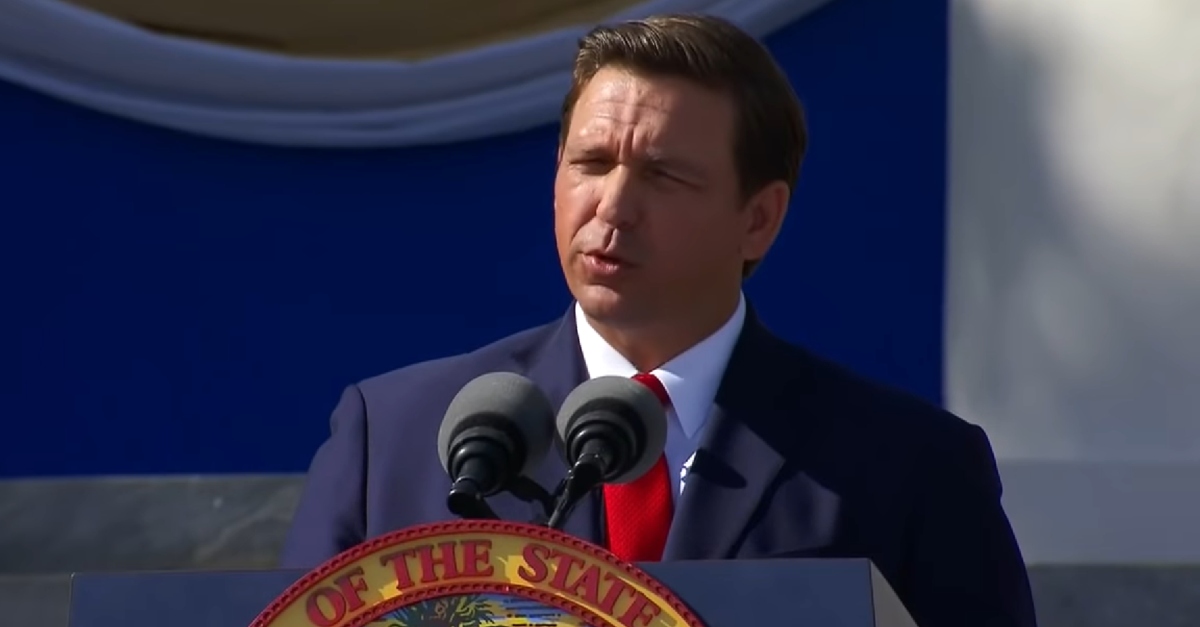
Florida’s Republican Governor Ron DeSantis says the state’s amendment restoring voting rights to formerly incarcerated individuals should be struck down absent the preservation of a controversial poll tax on such individuals. The state’s poll tax was previously ruled unconstitutional by a federal court.
On Tuesday, attorneys representing DeSantis and Florida Secretary of State Laurel M. Lee sparred with U.S. District Judge Robert Hinkle over the fate of Florida’s Amendment 4.
DeSantis’s attorneys argued that if it’s unconstitutional for the state to require formerly incarcerated people to pay fines, fees and restitution in order to vote, then the entire Voting Restoration Amendment must be thrown out because it is unconstitutional.
During Tuesday’s proceedings, Hinkle was highly suspicious of the legal claims and political motivations made by DeSantis and Lee.
Reporter Gary Fineout noted that Hinkle wondered out loud whether the defendants were trying “to run out the clock” by gaming the filing system. Hinkle observed that DeSantis and Lee waited several weeks to appeal his initial injunction and then an additional two weeks to file their motion to stay.
The Voting Restoration Amendment was passed overwhelmingly by 65 percent of Sunshine State voters in 2018.
“After the passage of Amendment 4 in November 2018, which restored the right to vote to as many as 1.4 million people with past felony convictions, many Floridians across the state expected to register to vote beginning in January 2019,” noted ACLU of Florida Executive Director Micah Kubic in a recent editorial. “This historic occasion marked the end of lifetime felony disenfranchisement in Florida and paved the way for so many of our loved ones to make their voices heard in a state that for far too long denied them the ability to fully participate in our communities.”
Florida’s GOP-controlled legislature, however, had other plans.
Initially, Republicans in Florida simply refused to put the will of the voters into effect. High-profile elected officials mused that they just weren’t able implement the Voting Restoration Amendment without guidance from the state legislature. Meanwhile, county officials pleaded with the state for “clear direction.” Eventually, Republicans crafted and passed SB 7066, a law which preconditioned the restoration of voting rights on the ability of formerly incarcerated individuals to pay–sometimes exorbitant–fines, fees and restitution.
Civil Rights advocates were quick to note the discriminatory outcome embedded in Florida passing what amounts to a poll tax.
“This law will disproportionately impact black Floridians with a felony conviction, who face the intersecting barriers of accessing jobs in a state with long-standing wealth and employment disparities,” NAACP Legal Defense and Educational Fund litigation deputy director Leah Aden said. “Because the Florida Legislature ignored these well-understood realities, SB 7066 must be stopped.”
The numbers don’t lie. Under the former felony conviction exclusion system in place the past 150 years, seven percent of Florida’s overall population was barred from voting. That number nearly trebled when applied to black voters. Upwards of 20 percent of Florida’s black population was denied the right to vote under those prior rules.
Barriers of Florida’s once-and-future Jim Crow system were swiftly resurrected and just as swiftly challenged in federal court.
As Law&Crime previously reported, Judge Hinkle agreed with the plaintiffs in an order which enjoined SB 7066.
“Florida cannot deny restoration of a felon’s right to vote solely because the felon does not have the financial resources necessary to pay restitution,” the judge noted. “And because, for this purpose, there is no reason to treat restitution differently from other financial obligations included in a sentence, Florida also cannot deny restoration of a felon’s right to vote solely because the felon does not have the financial resources to pay the other financial obligations.”
In a motion filed the day before Thanksgiving, DeSantis and Lee argue that their poll tax should be sustained because the Supreme Court once noted that “States are not forced by the Constitution to adjust all tolls to account for ‘disparity in material circumstances.’”
DeSantis and Lee concede, however, that the nation’s high court issued the following exception: “[t]he basic right to participate in political processes as voters and candidates cannot be limited to those who can pay for a license.” Notably, the case cited by DeSantis and Lee actually held that someone’s due process rights cannot be halted based on their inability to pay certain court fees.
The governor’s brief continues:
But that exception does not apply to this case. That is because although the “basic right to participate in the political process” may generally be a fundamental right under the Equal Protection Clause it is not a fundamental right to those convicted of a felony.
“The only remaining question is whether there exists a rational basis for withholding voting rights from felons who are genuinely unable to pay their criminal fines and restitution due to indigency,” the filing notes later on. “Defendants respectfully submit that such a basis clearly exists.”
Read the entire filing below:
Jones v. DeSantis 11/27/19 Motion to Stay by Law&Crime on Scribd
[image via screengrab/Fox News]